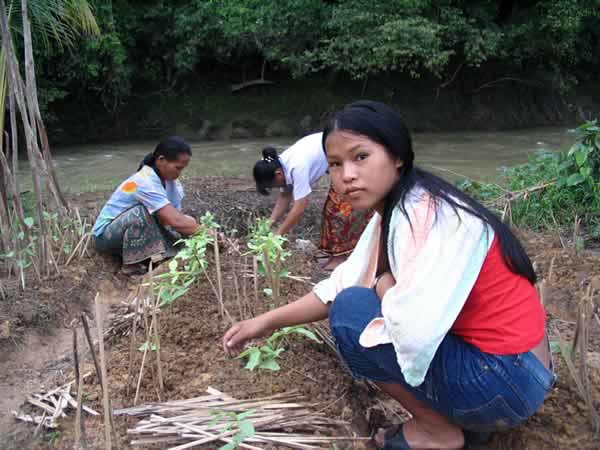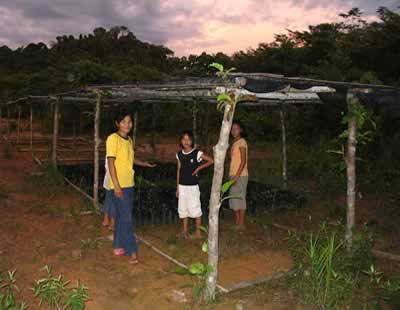Author
BY JESSICA LAWRENCE
For further information log on website :
http://www.earthisland.org/journal/index.php/eij/article/borneo_project3/
BY JESSICA LAWRENCE
 |
| The Penan women of Long Lunyim are now cultivating rice and vegetables to reverse the malnutrition caused by forest degredation from industrial logging. Photo: Jessica Lawrence |
Penan restore biodiversity, one seed at a time
Lina Kajan, a young Penan mother, is waiting for the giant canopy trees of the world’s oldest rainforest to bear fruit. When they do, she’ll traverse steep slopes and ravines, searching for fallen fruit and seeds. As she finds them, she’ll toss them into a homemade rattan backpack and make her way back to her village before dark.
Lina Kajan, a young Penan mother, is waiting for the giant canopy trees of the world’s oldest rainforest to bear fruit. When they do, she’ll traverse steep slopes and ravines, searching for fallen fruit and seeds. As she finds them, she’ll toss them into a homemade rattan backpack and make her way back to her village before dark.
In the patchwork of beauty and devastation that is Sarawak, Malaysia, Kajan belongs to a forest-dependent culture with highly developed systems for survival and self-sufficiency. The Penan are traditionally nomadic hunter-gatherers in the northern mountains of Borneo. They number about 10,000, and are among the most marginalized of the indigenous people of Malaysia. Today, most Penan have been forced into villages as the government appropriates their land for logging, but they continue to depend on forests for their sustenance. Defending their ancestral lands is politically dangerous in Malaysia, since the government views resistance to logging as “anti-development.”
When Kajan rejoins her friends and relatives upon their return from gathering in the forest, they will place the seeds in soil-filled plastic bags and water them well. By the end of the fruiting season, the 30 families of Long Lunyim hope to be caring for 2,000 seedlings. These trees will be planted in logged areas to provide wood, fruit, oil, dart poison, medicines, and food for wildlife.
In seven other Penan communities of the Baram watershed of Sarawak, villagers are prepared to do the same. The Borneo Project is helping them invest in the future and establish formal claims to the land of their ancestors.
In the village of Keluan, reforestation with native trees has been taking place for nearly 20 years. Kayan farmers seeking to improve the value of their fallowed fields have replanted 20,000 trees in areas degraded by logging, using seeds from the nearest patches of primary forest.
In 2004, leaders from the seven communities took a cue from Keluan and established the Indigenous Forests Restoration Initiative. With the help of small grants and equipment donations from Borneo Project, they built rainforest tree nurseries. Participants exchanged skills in composting, seedling survival, transplanting, and organic pest management.
One reason for this extensive effort to replant native species is that wildlife food sources have been severely degraded by logging, which removes the large canopy trees that provide food for squirrels, barking deer, bearded pigs, and dozens of other rainforest mammal species.
Planting trees on ancestral lands is also a political act. It allows indigenous communities to document a formal land use that is valid in the eyes of the Malaysian government. All uncultivated land is considered eligible for logging and conversion to industrial plantations, and native land rights are automatically “extinguished.” Planting trees is a form of cultivation that can legitimize land use by native peoples and challenge the rights of corporations.
 |
| Lina Kajan displays the newly built tree nursery. Photo: Jessica Lawrence |
A history of struggle
At Long Lunyim, the community has long been fighting to prevent logging of their primary forest by Rimbunan Hijau, one of the world’s most rapacious timber companies. In 2001, Long Lunyim worked with an ethnobotanical research team to document more than 200 species of useful plants found in their 440-acre sacred forest. It would cost the community over $34,000 per year to replace these non-timber forest products with items bought from the market – a crippling financial burden to people who earn precious little cash.
At Long Lunyim, the community has long been fighting to prevent logging of their primary forest by Rimbunan Hijau, one of the world’s most rapacious timber companies. In 2001, Long Lunyim worked with an ethnobotanical research team to document more than 200 species of useful plants found in their 440-acre sacred forest. It would cost the community over $34,000 per year to replace these non-timber forest products with items bought from the market – a crippling financial burden to people who earn precious little cash.
Research report in hand, the community asked Rimbunan Hijau to leave their protected forest intact. The company agreed, but then sent in bulldozers and chainsaw crews in violation of the agreement. When the community blockaded the bulldozers, several villagers were arrested on false charges, jailed, and tortured. Soldiers arrived and fired shots at the village from afar, but the community stood strong and the bulldozers finally pulled out. The arrested villagers were cleared of all charges, and a malicious prosecution case is now pending in court.
Nevertheless, logging, roads, and soil erosion have damaged two thirds of their forest. Outside the protected forest, the impact is even worse: vast areas lost their magnificent canopy trees. To this day, these sites are a dense mass of vines with few sources of Penan food, such as sago palm, green vegetables, fruit, or game. As a result, malnutrition has worsened in the village. For residents of Long Lunyim, reforestation is a vital step to improve the overall health of the community.
Organic gardens battle malnutrition
In April 2005, Lina Kajan organized the women of the Long Lunyim to fight malnutrition. Armed with kitchen knives and sharpened sticks, they cleared a patch of riverbank and planted beans, cucumbers, and leafy greens. This vegetable garden supplemented dwindling forest resources. Prior to the advent of logging, the Penan could gather everything they needed from the forest, with no need to grow crops or raise livestock. Today, villagers are struggling to learn cultivation skills on poor soils. With a small grant for tools and seeds from the Borneo Project, Kajan and her group are now tending a diverse community garden, adding ginger, papaya, watermelon, and corn to their crops. They hope to raise chickens in the near future.
In April 2005, Lina Kajan organized the women of the Long Lunyim to fight malnutrition. Armed with kitchen knives and sharpened sticks, they cleared a patch of riverbank and planted beans, cucumbers, and leafy greens. This vegetable garden supplemented dwindling forest resources. Prior to the advent of logging, the Penan could gather everything they needed from the forest, with no need to grow crops or raise livestock. Today, villagers are struggling to learn cultivation skills on poor soils. With a small grant for tools and seeds from the Borneo Project, Kajan and her group are now tending a diverse community garden, adding ginger, papaya, watermelon, and corn to their crops. They hope to raise chickens in the near future.
Take action: Sponsor a Penan youth in the Community
Organizer and Leadership Training. Trainees need a scholarship equivalent of just $12 per day. You can donate securely at www.earthisland.org/borneo/donate.html. Note "Penan Youth Fund" in the comments field. You’ll receive a certificate of sponsorship and regular updates from the student who has benefited from your gift. |
Penan Youth Community Organizer Training seeks scholarship support
The environmental injustices that burden Long Lunyim exemplify the vulnerability of Penan communities across Sarawak. Illiteracy, non-existent communications infrastructure, and a limited understanding of their legal rights hamper them. Long Lunyim has stated its desire to become independently capable of filing complaints, communicating with outsiders, and dealing with authorities. It hopes to share its lessons and experiences with other Penan villages facing similar struggles.
The environmental injustices that burden Long Lunyim exemplify the vulnerability of Penan communities across Sarawak. Illiteracy, non-existent communications infrastructure, and a limited understanding of their legal rights hamper them. Long Lunyim has stated its desire to become independently capable of filing complaints, communicating with outsiders, and dealing with authorities. It hopes to share its lessons and experiences with other Penan villages facing similar struggles.
In response, The Borneo Project is working with community and regional activists to establish a shortwave radio network for remote Penan settlements. In addition, funds are being sought to establish a series of Penan Youth Community Organizer and Leadership Training sessions. Young Penan, nominated by their communities, will study with Partners of Community Organizations(PACOS), one of the finest native rights and community-based conservation organizations in Southeast Asia. This training will enable young people to advocate for their communities. PACOS trainers will then accompany the youth back to their home villages to help them build networks and locally appropriate strategies.
Seed collector and gardener Lina Kajan is one of the talented young Penan eager to participate – just as soon as her community’s garden and reforestation nursery are well on their way to feeding her community and restoring the rainforest.
Jessica Lawrence is director of the Borneo Project.
For further information log on website :
http://www.earthisland.org/journal/index.php/eij/article/borneo_project3/





No comments:
Post a Comment